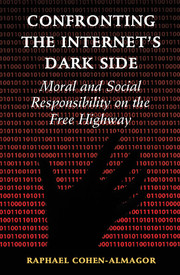Book contents
- Frontmatter
- Dedication
- Contents
- Acknowledgments
- List of Abbreviations
- Introduction
- 1 Historical Framework
- 2 Technological Framework
- 3 Theoretical Framework
- 4 Agent's Responsibility
- 5 Readers' Responsibility
- 6 Responsibility of Internet Service Providers and Web-Hosting Services, Part I: Rationale and Principles
- 7 Responsibility of Internet Service Providers and Web-Hosting Services, Part II: Applications
- 8 State Responsibility
- 9 International Responsibility
- Conclusion
- Glossary
- Selected Bibliography
- Index
6 - Responsibility of Internet Service Providers and Web-Hosting Services, Part I: Rationale and Principles
Published online by Cambridge University Press: 05 July 2015
- Frontmatter
- Dedication
- Contents
- Acknowledgments
- List of Abbreviations
- Introduction
- 1 Historical Framework
- 2 Technological Framework
- 3 Theoretical Framework
- 4 Agent's Responsibility
- 5 Readers' Responsibility
- 6 Responsibility of Internet Service Providers and Web-Hosting Services, Part I: Rationale and Principles
- 7 Responsibility of Internet Service Providers and Web-Hosting Services, Part II: Applications
- 8 State Responsibility
- 9 International Responsibility
- Conclusion
- Glossary
- Selected Bibliography
- Index
Summary
Commerce is as a heaven, whose sun is trustworthiness and whose moon is truthfulness.
–Bahá'u'lláh
For many years, the red-light district in Amsterdam has been one of the most notorious pornographic centers in the world. Dozens of sex shops offer merchandise for all human preferences, tastes, and perversions. I went to a few of them and asked for child pornography. The shop-keepers all said that they did not carry such material. They had thousands of magazines and videos; how did they know, with such unshaken confidence, that no such material had found its way into the store? When I stubbornly asked, “Are you sure?,” the response was a suspicious stare and angry conviction that no child pornography existed in their stores. They had taken measures to ascertain that such illegal material would not be available to the public.
Likewise, rowdy Internet service providers (ISPs) and Web-hosting services (WHSs) support rowdy websites. Would expecting them to scrutinize their sites to avoid certain illegal material be unrealistic? Does responsibility dictate for them to do this?
The issue of responsibility of ISPs and host companies is interesting and complex. Their actions and inactions directly affect the information environment. This chapter and the one that follows are concerned with social responsibility of ISPs and Web-hosting services WHSs. I distinguish between access providers that have no control over the messages and information they carry and service providers that offer content. Should the latter make the effort to monitor their sites for problematic information, or are they relieved of any responsibility? This is arguably the most intriguing and complicated issue of Net responsibility. I argue that ISPs and WHSs should aspire to take responsibility for content. In the next chapter, I assert that ISPs and WHSs should adopt a proactive stance in countering antisocial and violent content. This policy would benefit not only their customers and society at large but also their business.
- Type
- Chapter
- Information
- Confronting the Internet's Dark SideMoral and Social Responsibility on the Free Highway, pp. 147 - 176Publisher: Cambridge University PressPrint publication year: 2015

